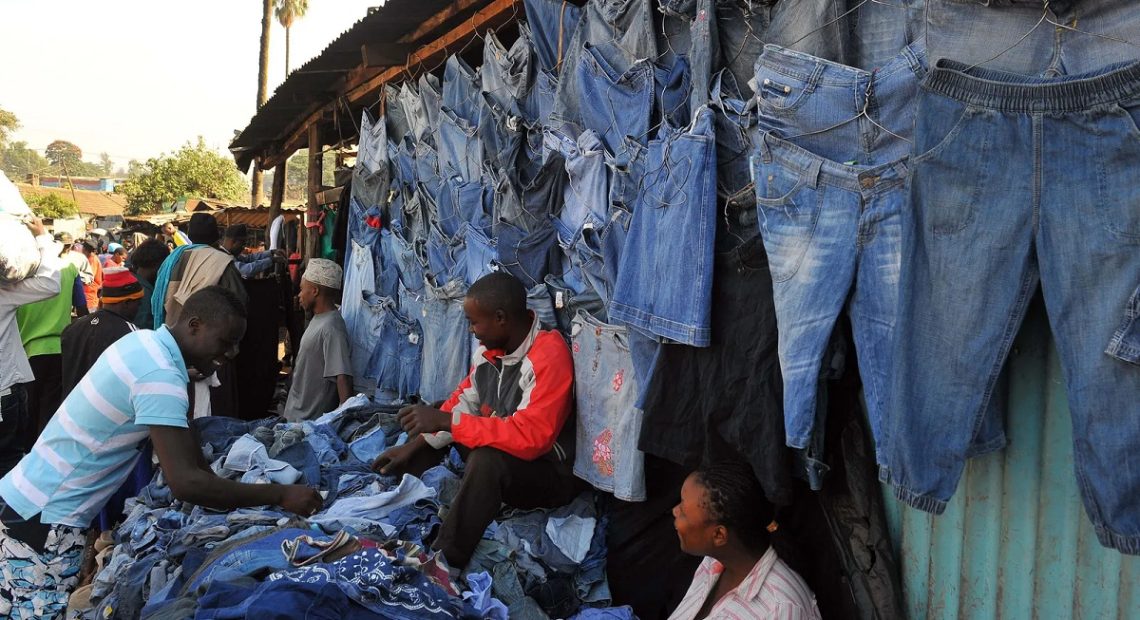

The Nigerian Customs Service announced its intention to place a ban on the sale of second-hand clothes, popularly called Okrika or Gwanjo in local parlance in Nigeria.
The move, ostensibly, is to protect local textile producers, according to the Nigeria Customs Service.
Imported used clothing, commonly known as second-hand clothing, is clothing that has been worn or discarded in rich countries and is then exported to third-world countries for resale.
Importing secondhand clothing has the potential to meet individual clothing needs while also putting food on vendor tables in impoverished countries.
Despite restriction by the Nigerian Customs, every nook and cranny of the country’s markets is filled with dozens of traders selling these clothes, from Lagos, Abuja, Kaduna, Jos, Onitsha, Enugu, Benin City, Akure, Minna, Oshogbo, Port Harcourt, Delta, Akwa-Ibom, and lots more.
A report by Al Jazeera estimated that 80 percent of Nigerians dress is illicit, used garments that are illegally moved into the country from neighboring countries.
Nigerians enjoys second-hand attire; Ivory Coast imports are estimated at 13,066 tons, according to the UN Comtrade database, while Ghana imports 79,963 tons.
It’s believed that many relatively poor people in the region prefer second-hand western clothing over new ones because it is often of better quality and has associations with the western cultural imperative.
Church Paul, a dealer of second-hand clothes at the Kaura market in Abuja, said, “It isn’t just the poor who shop here”; it cuts across the class of people that frequent the market looking for unique outfits.
He said the importation of used clothes provides these individuals with a cost-effective alternative by offering them access to quality apparel at considerably lower prices compared to new garments.
Paul, who started the business when he was in the US, said lots of people were into the trade of second-hand clothes, adding that “the number of dealers and vendors in Arena and Katangowa markets in Lagos were far above a thousand.”
I import three containers every 2–3 months at the rate of N30 million each, and a belt of grade one trousers sells for N500,000, while a T-shirt with a round neck sells for N320,000, Korean jeans sell for N330,000, and a shirt from London sells for N400,000, Paul added.
Paul said that the number of people involved in the second-hand clothing business between Kaura, Karmo, Yanya, Maraba, and Suleja markets cannot be quantified.
A vendor, Abdul Suleman, in the popular second-hand clothes market in Kasuwan Bacci, Kaduna, said the trade helps him to build a house and sustain his family and siblings.
Suleman, who said every day, hundreds of customers squeeze through the market to grab a bargain, noted that he makes a lot of profit out of the business.
He said clothes that people mostly buy include men’s shirts, ladies cotton dresses, men’s cotton pants, men’s underwear, ladies chiffon dresses, and ladies’ t-shirts.
The vendor estimated that more than 200 people were involved directly or indirectly in the business of second-hand clothing within the market alone.
A senior lecturer at the Department of Marketing at Kaduna Polytechnic, Malam Ibrahim Ala, said the trade of second-hand clothes often helps stimulate the local markets and generate employment opportunities as it requires handling, distribution, and retail operations.
He said that by embracing imported used clothes, individuals in Nigeria can improve their standard of living through increased access to affordable clothing options while contributing positively to their local economies.
Malam Ala explained that in Nigeria, the availability and affordability of new clothing are persistent challenges due to limited resources and economic constraints.
The lecturer added that economic debates about the effect of used clothes on domestic production are probably because enforcement allows used clothes to enter Nigerian markets on mass, regardless of the law.
Therefore, the impact of imported used clothing in Nigeria is complex and multifaceted, with both positive and negative consequences.
Positive effects
Used clothes are significantly cheaper than new garments, making them accessible to low-income populations. This can improve their living standards by reducing spending on clothing essentials.
The import and sale of used clothing create jobs in transportation, sorting, cleaning, repair, and retail. This can contribute to poverty alleviation and economic activity.
The trade can foster small-scale entrepreneurship, with individuals running market stalls or selling clothes from home.
Used clothes offer a wider variety of styles and brands than might be available locally, catering to diverse tastes and preferences.
Negative effects
The influx of cheap used clothing can stifle the growth of the domestic textile and garment industry. This can lead to job losses and reduce opportunities for local manufacturing and value creation.
Transportation and processing of used clothing generate greenhouse gas emissions and contribute to pollution. Textile waste from discarded clothes can also pose environmental challenges.
The quality of used clothing can vary considerably, with some items being worn out or containing harmful chemicals. This can pose health risks to consumers.
Over reliance on imported used clothing can discourage self-sufficiency and hinder the development of a sustainable clothing industry in the long term.
The government’s policies and regulations regarding used clothing imports can significantly impact the industry.
Restrictions on import volumes or minimum quality standards can help mitigate some negative effects.
A large portion of the used clothing trade in Nigeria operates in informal markets, making it difficult to track and regulate. This can create challenges for ensuring fair trade practices and protecting consumers.
Promoting the recycling and up cycling of used clothes within the country can help create a more sustainable model for the industry.
Overall, the impact of imported used clothing in Nigeria is mixed. While it offers some immediate benefits for individuals and communities, it also poses significant challenges for the long-term development of the local textile industry and the environment. Finding a balance between these competing interests is crucial for ensuring a sustainable and equitable future for the clothing sector in Nigeria.
FRCN Abuja/Adetutu Adetule
Subscribe to our Telegram and YouTube Channels and also join our Whatsapp Update Group